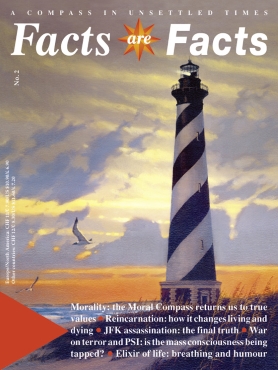The Decline of Morals in the West
- and why casting off the shackles of morality has not made us free.
How times have changed - and with them our dreams. "For centuries, the goal of liberating the tomb of Christ could fill the hearts of poor and rich alike with wild dreams and make them prepared to pay the ultimate sacrifice. Today, in contrast, the dream of a heated swimming pool no longer shifts tired bums ten unpaid steps over the street." The author of these words is Asfa-Wossen Asserate, a prince of the Ethiopian royal family and author of the imaginative book Manners. Today no-one would even be willing to liberate the tomb of Christ even if they travelled to the Holy Land by jet plane and stayed in a luxury hotel - unless their expenses were reimbursed and the whole project did not count as a vacation.

"Avarice is horny" was the successful German advertising slogan of all time. The copywriters knew that they were "scraping the limits of morality". Avarice is surely one of the seven deadly sins and 'horny' is still a dirty word.
Honour has become old hat. Those who were conscious of their honour in earlier times wanted, says Asserate, "to grow, they did not wish to 'add a single cubit' to their greatness, but merely to reach its full measure." Asserate equates this 'greatness' with the concept of 'genius' as understood by the ancient Romans: a version of oneself in larger-than-life format - a kind of more perfect superego. There was a time when this seemed a worthwhile goal to strive towards. Today, one merely buys oneself an aristocratic title.
And it was self-evident for those who were aware of their honour to accept no money for activities carried out at the service of the state - officers equipped their regiments at their own cost, poets and musicians received no more than honorary gifts, but did not sell their works, and until the end of the 19th century even general practitioners only received a 'fee' at the end of the year for their unpaid services during the year - so it was quite natural for them not to issue an invoice. In contrast, we now find more and more "bribery comedians" among the ranks of civil servants who have no scruples about soiling their hands with filthy lucre in illicit business dealings.
Money (no longer) stinks. It is there to be grabbed - with both hands. A TV production team recently set up a little test. Mulled wine was sold at a Christmas market. The salesgirl deliberately gave each buyer too much change. At first only a few euros, ultimately up to fifty, even a hundred euros too much. No more than two people drew her attention to her mistake - in both cases the sums involved were small. All the others felt no shame when subsequently confronted by the reporter, although they admitted that they had indeed noticed the mistake. Any residual sense of honesty they may have had merely produced responses such as: "I was pleased with the gift", or "one takes what one gets", or even "I thought I would use the money to buy more mulled wine from the same booth".
The slumbering conscience
We appear to have lost our conscience in the last few decades. German poet Matthias Claudius tells us why this is so: "If a man ignores the prompting of his better nature or lets his baser nature express itself untrammelled, then his conscience gradually speaks more and more softly and is ultimately completely silenced." It's the same as with thirst: if someone continues to drink too little for too long, the body eventually stops sending thirst signals - they would in any case go unheeded. Only when he thinks better of it and drinks more than ever does he feel thirst again.
So we have let our conscience sink into a deep slumber, reflecting the same - naturally unconscious - thoughts expressed by the murderer in Shakespeare's drama Richard III.: "I'll not meddle with it: it is a dangerous thing: it makes a man a coward: a man cannot steal, but it accuseth him; he cannot swear, but it cheques him; he cannot lie with his neighbour's wife, but it detects him: 'tis a blushing shamefast spirit that mutinies in a man's bosom; it fills one full of obstacles: it made me once restore a purse of gold that I found; it beggars any man that keeps it: it is turned out of all towns and cities for a dangerous thing; and every man that means to live well endeavours to trust to himself and to live without it."
Managers who accept compensation of hundreds of millions of euros for failing in their job and letting their workers starve, live without a conscience. The same applies to super-managers such as Enron CFO Andrew Fastow, who helped his company conceal billion-dollar debts and inflate profits while rewarding himself to the tune of 45 million dollars for such shrewd transactions. Others act without a conscience, such as a certain Richard Cheney, who paid bribes to land a billion-dollar order in Nigeria for his company Halliburton - and later used this same ingenuity as US Vice President to gain the order for getting Iraq's oil production flowing again for the same company (according to the motto: use the skills you have learnt!).
Many other names could be enumerated - Mannesmann and Parmalat, Elf-Aquitaine or WorldCom, Arthur Andersen LLP and Citigroup. "The managers were dishonest and greedy and have betrayed their companies" observed Hewlett Packard CEO Carly Fiorina in summing up the situation. And German news magazine Der Spiegel (no. 48/2003) comments: "We see it again, the image of Wall Street run by sharks and rogues. And if we needed further proof of how deeply the world's premier financial centre has sunk, it was provided by the US news bulletins on Tuesday evening: dozens of Wall-Street professionals in handcuffs, surrounded by FBI agents with hatchet faces. (...) The pictures seem to again prove that only one thing is sacred to Manhattan's financial jugglers: their own profit."
Is anyone really deeply indignant about this? No. What people feel is at most a malicious pleasure that the bigwigs have been caught out doing what they themselves do every day. "Survival in the swindler economy" was the title of an article in German illustrated magazine Stern (3/2003) that continued: "The swindler economy has many faces. It appears as superfluous 'travel expenses' on a tradesman's invoice, or in the guise of a medical practice where a harmless cold quickly grows to a costly treatment for a life-threatening illness, and is far from ending at the bank counter where an enthusiastic 'adviser' helpfully tries to sell us his own establishment's junk stock.
Even institutions and companies that should be above all suspicion have slid into the quagmire of dubious machinations. Thus Germany's Federal Labour Office systematically falsified its employment statistics for years, Munich's retirement and nursing homes doctored their performance figures, and Stuttgart editorial house Motorpresse-Verlag fudged the circulation figures of its various magazines.
The criminal statistics confirm the trend: of all known types of crime, business felonies are growing most quickly, by 21.3 percent in 2001." Uwe Dolata, author of the book Corruption in Germany's Economic System says, "corruption has now reached epidemic proportions". Bribery is "a nationwide phenomenon that propagates like a cancerous growth. We can safely assume that bribery occurs everywhere in Germany - in public authorities, parliaments and the business world." The damage, says Dolata, who has been fighting corruption for the last eleven years within the Association of German Criminal Investigation Officers and several international associations, amounts to some 68 billion euros annually in Germany alone. So it's no wonder that at the end of the 1990s the OECD already castigated Germany "as the most corrupt country in the world".
One might assume that the increasing consumption of sleeping tablets might have something to do with these facts, but that's not the case. Modern-day folk prefer to go along with aphorist Stanislaw Jerzy Lec, who noted that: "His conscience was clear, as he never used it." The conscience, called "the awareness of an inner court of appeal in man" by philosopher Immanuel Kant, is closed on Sundays as well as workdays, twenty-four hours a day.
The past: a morality of fear
How have we come to this pretty pass? Does it have any connection with this observation from a particular social scene: "Everything has become worse, only one thing has become better: morality has become worse".

"Sex, Lies & Politics": After a scandal surrounding the mayor of Hamburg, who was outed as gay, 93% of those asked in a Spiegel-survey said that his sexual orientation was fine by them.
Sometimes moral censure may have been excessive - especially when it surpassed itself to become a double standard. And the past two hundred years have shown us a rich harvest of that. "Moral indignation is jealousy with a halo", wrote English author H. G. Wells wryly and not without reason, and even Rousseau, the Swiss philosopher of nature, actually meant the false proud (double) morality when he complained: "Morality in love is an artificial feeling invented by society. Women celebrate it with much skill and great devotion in order to establish their kingdom and make the sex that ought to obey the dominant one."
Morality as an instrument of power is a game that the church has played for centuries. And when it became powerless, morality also sank into the mire of the passions - and dragged the conscience down with it. Let's quote Rousseau again: "The conscience is the voice of the soul; the passions are voices of the body." The latter make an almost ear-deafening roar today - in any case loud enough to prevent us hearing the small still voice of the conscience that Victor Hugo called "the thinking of God". But has not God proved to be an illogical and useless crutch that an 'enlightened' man has long since managed to dispense with?
And so, having passed the sceptre to the unbridled passions, our society has descended into vulgarity. Yes indeed, ladies and gentlemen, vulgarity is rather like a tourist - it is always the other fellow and never ourselves. And yet we must face the unpalatable fact that so-called civilised Western man is becoming increasingly vulgar - and is thus drawing not only himself, but the whole world into a slough of despond.






